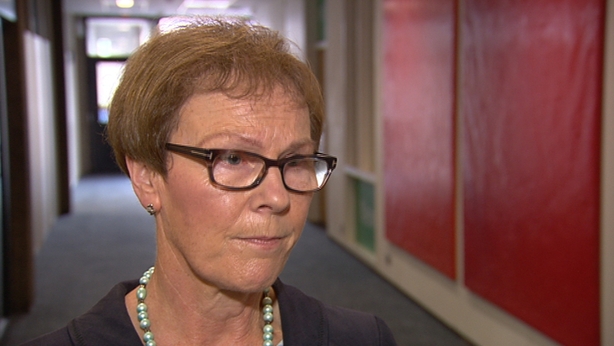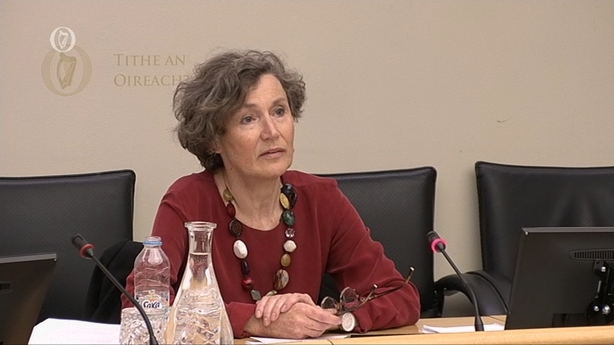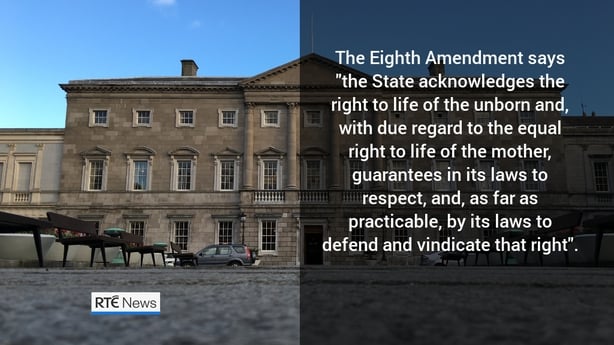Independent TD Mattie McGrath of the Rural Independent Group has walked out of the Committee on the Eighth Amendment describing it as a "charade".
Deputy McGrath took offence at the Sinn Féin Deputy Jonathan O'Brien who said the Tipperary TD had "mesmerised" the committee.
Independent TD Mattie McGrath has walked out of Oireachtas Committee on the Eighth Amendment, calling it a charade pic.twitter.com/AvM49JBAmv
— RTÉ News (@rtenews) October 25, 2017
Mr McGrath criticised committee chairperson Catherine Noone for not reading a letter by psychiatrist, Patricia Casey, who could not attend today and who, he said, would have opposite views to those of a witness, Professor Veronica O'Keane, on the issue of mental health.
Ms Noone said there is no rule that she has to read a letter from a witness who is unable to attend. However, Mr McGrath accused the committee chair of being biased.
When Sinn Féin Senator Paul Gavan pointed out that Mr McGrath's allotted six minutes was up, the Independent TD accused him of "ignorant interruptions from people who won't tell us where Jean McConville was murdered or hidden", he said.
Ms Noone called on Fianna Fáil's Anne Rabbitte as the next speaker, who paused and apologised.
"Sorry I was...", she began at which point Sinn Féin's Jonathan O'Brien interrupted with the word "mesmerised", resulting in laughter.
Deputy McGrath took offence at the comment and called on Mr O’Brien to withdraw it. He subsequently described the committee a charade and walked out.
There was limited discussion at the Citizen's Assembly regarding foetal anomalies, according to the Chairperson of Termination for Medical Reasons Ireland.
Gerry Edwards told the committee that gestational limits put forward to the citizens, were sets of gestational limits for all the votes, rather than taking situations into context.
"They weren't terribly well informed as to the process in terms of diagnosis and getting a prognosis", he said.
Mr Edwards said when a severe or fatal condition is given, time is required to think about it and he said that putting an "arbitrary gestational limit" in front of parents saying "you need to make your mind up before we hit this point in time" or you are not going to be able to avail of services in Ireland is "very damaging".
He said there is a risk of leading parents into decisions more hastily than they otherwise would, which could result in people choosing to opt for a termination in pregnancy, where if they had more time they maybe realise it is not the decision for them.
"But once it's made, it's made", he said.
He said that in relation to foetal and maternal health a gestational limit cannot be applied.
We need your consent to load this rte-player contentWe use rte-player to manage extra content that can set cookies on your device and collect data about your activity. Please review their details and accept them to load the content.Manage Preferences
The committee also heard from a woman whose baby died in the womb.
Claire Cullen-Delsol explained the difficulty of the five weeks between her diagnosis and the death of her baby in her womb.
Ms Cullen-Delsol chose not to travel for a termination because she said she could not face the thought of leaving her other children and she also could not afford it.
She told the committee that she mourned her baby twice, when she thought her baby had died.
The TFMR representative said it felt like she did not matter. Ms Cullen-Delsol told the Committee that she ended up with post-traumatic stress disorder and is on medication since.
"I think if I'd been given the control it would have made all the difference," she said.

The CEO of the Dublin Rape Crisis Centre has told the committee that an estimated 4% of clients reported pregnancies as a result of rape.
In her opening statement Noeleen Blackwell told the committee there was no reliable national data on the prevalence of pregnancy as a result of rape because there was massive under reporting of rape.
She said that from their own statistics over the past eleven years, and using figures from the Rape Crisis Network of Ireland, approximately 4% report pregnancy as a result of rape.
Fine Gael TD Peter Fitzpatrick pressed Ms Blackwell on her views of people who are conceived after a rape.
Ms Blackwell said their job is only to support victims of rape regardless of their decisions, and they refer individuals who are pregnant as a result of rape to the Crisis Pregnancy Agency for advice.
Tom O'Malley, a senior lecturer in law at the University of Limerick, outlined the legal complexities involved in providing access to abortion in the case of rape, in particular whether the victim has reported to the authorities or not.
He told the committee that research on abortion laws in European countries, such as Portugal, required that there be "serious evidence" or a "significant indication" that the pregnancy resulted as rape.
Earlier, the committee was told that the mental health of every person in Ireland is being damaged by the Eighth Amendment.

Professor O'Keane from Trinity College, who works with Tallaght Mental Health Services, told the committee that at the heart of the problem of abortion in Ireland is that of unwanted pregnancies.
She said there will always be a requirement for abortion care.
In her opening statement, Prof O'Keane said the mental health risks associated with unwanted pregnancies are high, and are incalculable for women who are in a position where abortion care is not available.
Prof O'Keane said the mental health arguments for decent abortion services apply, but not just to the women who need abortion care and who can or who cannot travel, but to every citizen.
"We need a real-life solution to the real life problem of unwanted pregnancy and not a moral, ethical, metaphysical, philosophical discussion about abortion", she said.
She added that the current solution being applied through travel or breaking the law by procuring the abortion pill is unworkable and she called for "compassionate care".
She also said Citizens Assembly recommendation - that all facets of mental health well-being, from suicidal risk to damage to mental health be considered as ground for abortion - takes into account the complexity of each individual woman's lived experience of an unwanted pregnancy.
"The rigidity of constitutional absolutes is the polar opposite of what is required to deal with the need of women with unwanted pregnancies", she said.
She concluded her statement to the Committee by saying that while any constitutional ban remains in place, doctors will remain unable to practice medicine in line with the principles of best practice, and women's mental health will continue to be damaged.
Last Wednesday, the committee formally voted "not to retain article 40.3.3 of the Constitution in full".
It is expected that a request for another vote will be made at today's meeting by Solidarity/People Before Profit TD Ruth Coppinger on the question of repeal or retain.
This is likely to be resisted based on a Fianna Fáil motion from last week to postpone further voting until the committee concludes its work in December.
Ms Noone has said she would facilitate discussion on the matter to offer what she described as a clearly defined pathway for the committee's decision making process on the substantive issues.

Today is also the last day Deputy Coppinger will be on the committee.
She will be replaced by Bríd Smith, also of the Solidarity/People Before Profit Group, as was agreed at the establishment of the Committee.
Speaking ahead of the meeting Ms Coppinger called on members who believed in repeal to vote for it now to ensure it forms the basis of the referendum.
However, it is expected that Fianna Fáil will be supported by Fine Gael in its proposal to delay further votes until December, but it will require the support of the Independent Senator Ronán Mullen and Mattie McGrath of the Rural Independent Group in order to secure a majority.
Ms Coppinger has accused Fianna Fáil and Fine Gael of "banding together to once again delay and play around with womens' rights".
Former MEP holding protest over abortion video
Former MEP Kathy Sinnott is holding a protest outside the gates of Leinster House this afternoon to coincide with the committee meeting.
The 67-year-old is protesting against the committee's rejection of a proposal by Mattie McGrath that it watch a video of an abortion.
Ms Sinnott represented Ireland South between 2004 and 2009.

